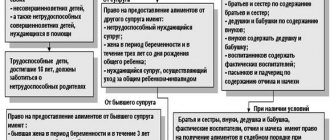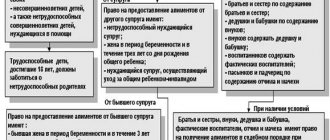Author of the article: Yulia Kaysina Last modified: January 2021 6120
After marriage, spouses have mutual responsibilities, including the duty to take care of each other, including after a divorce (Chapter 14 of the RF IC). If one of them, for any reason, has completely or partially lost his ability to work, alimony for the disabled spouse can be recovered through the court. Sometimes this can be done even if the disability occurred after a divorce.
When a disabled ex-husband or wife can count on alimony
Ex-husband and wife, being in a difficult situation or having serious health problems, have the right to file a lawsuit demanding to recover money from their partner for their maintenance under certain conditions.
The legislation of the Russian Federation recognizes disabled people as disabled, that is, citizens who have persistent health problems resulting from illnesses, injuries, congenital defects, as a result of which they cannot live a full life and need social protection.
To recognize a person as incapable of work, a medical and social examination is required, after which a special conclusion is issued, and then a corresponding certificate is issued. The issued document becomes an official confirmation of disability, but the mere fact of disability of the former spouse is not enough to collect alimony from the partner.
The court determines alimony payments, and in order for it to make a positive decision, the following circumstances must exist:
- need is an evaluative concept that assesses the level of material security of a citizen;
- disability – was acquired during marriage or occurred no later than 12 months after the divorce.
The judge always establishes and verifies facts that should confirm the poor financial situation of the plaintiff. These include:
- Sources of funds and their size.
- Stability of earnings and circumstances influencing fluctuations in the amount.
- The ratio of incoming funds and expenses of a person in need to provide for his basic needs.
- Common children under 18 years of age (with whom they live and who supports them).
- Financial assistance from other family members.
- Other circumstances affecting the financial situation, for example, the need for expensive treatment.
How to avoid paying alimony legally?
In practice, claims for the recovery of alimony from a former spouse in favor of a disabled person are filed quite rarely and have ambiguous prospects, especially if the defendant is not a very wealthy person.
Legal ways to avoid paying alimony can be divided into 2 groups.
If you have every penny in your account, then you will need to prepare for the court and collect as many papers as possible confirming that your financial situation is very deplorable.
Any documents confirming your expenses will be suitable for these purposes: copies of receipts for housing and communal services, payments for kindergarten, loan agreement, etc.
It also makes sense to provide the court with documents confirming that your income is small and does not allow you to pay alimony. Such documents can be a salary certificate, a 2-NDFL certificate, a certificate from the employment center, etc.
A certificate about the number of children, documents about the presence of elderly parents in need of care - all this will also not be superfluous in court.
In addition, you can “dig” from the other side. For example, if you know that your ex-spouse has unofficial income (from renting out an apartment, dividends from shares, earnings on the Internet, etc.), you can also declare this in court and, preferably, provide evidence
Article 92 of the RF IC states that the court may release a spouse from alimony obligations if it is proven:
- That the spouse’s disability (incapacity for work) occurred as a result of drunkenness, drug addiction, or as a result of his committing an intentional crime. Everything is clear with the first two cases, but to clarify the third, we will give an example: the husband, in a drunken stupor, took out a knife and hit a man with it. He, in self-defense, shot at the attacker with a traumatic pistol and caused severe injury, which subsequently resulted in disability. In this case, the spouse who has become disabled as a result of his own criminal actions will not be able to collect alimony.
- If the marriage was short-lived
- If the spouse demonstrated inappropriate behavior in the family (drunken, assaulted, etc.)
Dear readers of “Family Lawyer”! This article describes the most common, typical issues of collecting alimony in favor of a disabled person. However, each situation is individual and requires careful analysis. If you have specific questions for a family lawyer, order an online consultation on our website using the widget or form below. It's free!
Disability 1, 2, 3 groups and alimony
Separately, it is worth considering the situation when the disabled person is not the recipient of alimony, but the payer. In general, disability of any group does not relieve parents of the obligation to financially support a joint minor child. Alimony is still withheld from wages if the citizen continues to work, or from benefits.
Some adjustments may occur if disability benefits are the parent’s only source of income, or if a working disabled person receives temporary disability benefits, then the court may review the form of alimony and order its payment in a fixed amount.
Payment procedure
The procedure for paying alimony is determined in two ways:
- By bilateral agreement.
- Through a petition to the courts.
The option of a bilateral agreement is the most preferable for both parties, since in this case the payments become voluntary, which means they will be paid in good faith. The following points must be included in the agreement:
- a percentage of earnings or a fixed sum of money/part of it will determine the amount of financial assistance.
- possible order of payments: one-time or one-time, in the form of monthly or quarterly payments, can the transfer of any real estate that can be sold or leased serve as assistance?
A bilateral agreement must be certified by a notary office, otherwise the payer will be able to refuse payments. The following documents must be attached to it:
- Identity document of both parties.
- MSEC conclusion on the spouse’s disability.
- Pensioner's ID.
- Certificate of income of the spouse for the previous 3 months.
By the tribunal's decision
Alimony for a disabled spouse after a divorce is also paid; for this it is necessary to file a claim. This application can be submitted to any department of the court of first instance at the place of actual residence of the plaintiff. This may be the place of actual residence of the ex-wife or ex-husband in accordance with Art. 29 Code of Civil Procedure of the Russian Federation.
This is also important to know:
Child support for an adult child
In accordance with Art. 333.36 of the Tax Code of the Russian Federation on the basis of the provision that the plaintiff, who is a disabled person of group II or II, should not bear the state fee. If the spouse is a disabled person of group III in accordance with Art. 333.19 of the Tax Code of the Russian Federation, the amount of the fee will be determined based on the size of the claim. In this case, if the court decision is satisfactory, the payment of the state fee will be collected from the ex-spouse.
The statute of limitations for such cases in accordance with the Civil Code of the Russian Federation is 3 years.
Art. 131 of the Code of Civil Procedure regulates the requirements for a claim for the assignment of alimony to a disabled spouse. When considering this case, it is necessary to take into account:
- date of official divorce and registration of marriage;
- joint or separate budget;
- presence or absence of joint children (adults and minors);
- the appearance of disability during marriage or after divorce;
- determine the amount of the claim that the plaintiff will receive during the year.
Documents that must be attached to the claim:
- A copy of the plaintiff's identity document.
- Disabled person's certificate.
- A copy of the application for alimony intended for the defendant.
- A copy of the divorce certificate.
- Documents indicating the amount are necessary to provide financial support for the ex-wife.
- Documents confirming the ex-wife's need.
- If the plaintiff is a disabled person of group 3, confirmation of payment of the state fee is required.
- Information about the defendant’s income; if it is not possible to provide these documents, it is necessary to apply to the court for such an official request.
- If there is a representative, a power of attorney certified by a notary is required.
Is it possible to reduce the amount of alimony based on disability?
A child support worker with a disability can rarely boast of a high income; as a rule, he lives on a small allowance, sometimes working part-time at a simple job that pays little. At the same time, he spends a lot of money on treatment and maintaining health.
Therefore, a disabled parent can submit an application to the court with a request to reduce the amount of alimony. Please note that the court will not completely remove alimony obligations; we are only talking about reducing them, and then only when the citizen provides convincing arguments in favor of this decision.
When alimony is not collected from the former spouse of a disabled person
Article 92 of the RF IC stipulates cases when a judge may refuse to satisfy a claim for alimony to a disabled former spouse. A potential payer is exempt from maintaining a disabled husband or wife if he:
- deliberately contributed to the onset of disability, for example, by drinking heavily or taking drugs and generally leading an unhealthy lifestyle;
- committed criminal or violent acts against the defendant;
- was in a marital union for less than 5 years.
Important! Alimony cannot be awarded to a former spouse if he became unable to work before marriage or a year after the divorce, and also if the plaintiff is able to provide for himself.
Expenses
In accordance with Art. 333.36 of the Tax Code of the Russian Federation, a plaintiff recognized as a disabled person of group I or II is exempt from paying state duty. Applicants who have III disability group must pay a fee.
In Art. 333.19 of the Tax Code of the Russian Federation provides for a state duty of 150 rubles if the application is submitted by a spouse of disability group III who is incapacitated. If the claim also addresses the issue of assigning alimony for the maintenance of a common minor dependent, then the amount of the state duty is 300 rubles.
Free legal consultation We will answer your question in 5 minutes!
Call: 8 800 511-39-66
If the court's decision is positive, the defendant will compensate the plaintiff for paying the state duty.
Free legal consultation
We will answer your question in 5 minutes!
Ask a Question
How not to pay child support to a disabled person
In addition to the cases described above, when the court refuses to collect alimony (the citizen himself caused himself to be disabled or received it outside the marriage union), payments are not made if the able-bodied spouse has other dependents, for example, small children from a new marriage or elderly parents, or he repays the loan.
Financial assistance to the ex-wife is assigned only when the husband has enough financial resources to pay it. If his income is below the subsistence level, then the application for recovery will be rejected, since the payer will not be able to provide himself with the bare minimum.
Arbitrage practice
In each case, the judge takes an individual approach to resolving the dispute.
Thus, case 33-29209/2017, which was resolved as a result of an appeal by the judicial panel of the Moscow Regional Court. Plaintiff Anna lived in a marriage with her husband for more than 20 years. They had two children: a daughter and a minor son, in whose upbringing and maintenance, as the plaintiff proved, the plaintiff did not participate. As a result of heavy physical work at the enterprise, the plaintiff was injured and, according to the results of the medical commission, became a disabled person of group III. Since the defendant did not provide documents on earnings, the plaintiff demanded an amount that was a multiple of three regional subsistence minimums, in the amount of 30,000 rubles. The court of first instance denied the plaintiff's request.
This is also important to know:
When can you collect alimony from your grandparents?
Reasons for refusing to satisfy the claim:
- The plaintiff did not provide information about the material well-being of her ex-husband. in order to demand alimony from your ex-spouse, you must provide documents about his financial condition (Article 90 of the RF IC)
- The plaintiff was unable to provide evidence that the father does not provide for or raise his minor son.
- Being a disabled person of group III, the plaintiff can perform work remotely.
- It turned out that the plaintiff registered an individual entrepreneur - which allows her to provide for herself and her minor child.
If there was an injury and a disabled child, the court would have made a completely different decision.
How is the need for alimony determined?
In order for the court to decide to award alimony to a disabled spouse after a divorce, he must prove his need for financial assistance from his former partner. First of all, you will need certificates and documents confirming your unsatisfactory state of health, and as a result, the inability to work fully.
In addition, statements of income received and checks for medicines and treatment can be used as arguments; if the judge sees that the money available to a disabled person is not enough to maintain his condition, then most likely the claim will be satisfied.
Alimony agreement
An agreement on material support may be voluntary. In this case, the spouses draw up an agreement and have it certified by a notary. The document specifies the size and frequency of payments, indexation, and method of transferring money. They also indicate the conditions for changing and terminating the contract. Such an agreement has the force of a writ of execution, so if the payer stops making payments, this document can be used to contact the bailiffs for forced collection of funds.
The method of calculating alimony can be any - a fixed amount or a percentage of income. Also, material support can be expressed in payment of utility costs, purchase of medicines, etc. The main thing is that the agreement suits both parties. It must be borne in mind that once an agreement is signed, it will be difficult to challenge it. Either a significant change in the conditions will be required (for example, the recipient’s health has deteriorated sharply and income has fallen), or the agreement will be declared invalid on the grounds of Art. 178 and 179 of the Civil Code of the Russian Federation (threats, deception, misconception regarding the nature of the transaction, etc.).
Who is entitled to alimony after divorce?
After the divorce of a marriage, alimony for the maintenance of an ex-wife can be assigned not only to disabled people; women also fall into the category of those in need:
- in a situation or having children under 3 years old in common with the child support provider;
- caring for a joint child who has been disabled since childhood (and payments are made until the child reaches adulthood);
- who became disabled during marriage or a year after its dissolution;
- after a long marriage and subsequent divorce, retired and no longer able to support themselves.
Documentation
Documents that must be attached to the claim:
- a copy of the statement of claim for the defendant;
- a copy of the marriage/divorce certificate;
- disability certificate;
- receipt of payment of the fee (disabled group LLL);
- certificate of family composition;
- certificate of actual income of the plaintiff and defendant;
- checks, receipts, as well as other documents confirming the amount of expenses of a disabled person;
- the presence of a notarized power of attorney if the interests of one of the parties are represented by a proxy.
If there is other evidence of need, the list of attached documents can be expanded.
Collection for the previous period
The ex-wife has the right to go to court after an unlimited amount of time, from the moment she becomes eligible to receive alimony. The legislation only limits the period for collecting funds, that is, the alimony payer (if the claim is satisfied) will have to pay the alimony arrears for no more than 3 years.
Such a development of the situation is only possible if the woman did everything possible to receive financial assistance, but the husband shirked his responsibilities. It is worth noting that, as sanctions against the evader, the court may make a decision according to which the spouse will be left without his share of the inheritance, and it will go to his ex-wife.
Termination
The writ of execution for alimony becomes invalid in the following cases:
- restoration of the claimant's ability to work. In this case, the payer applies to the court to terminate payments;
- change in the financial situation of the parties: the emergence of an additional source of income for a disabled person or a deterioration in the financial situation of the payer.
In the first case, payments stop regardless of whether the ex-spouse continues to need money. In the second, the judge's decision will depend on the circumstances of the particular case.









